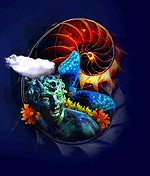|
|
Mudsong
Michael Spring
Pygmy Forest Press
ISBN Number: 0-944550-71-1
Reviewer: Collin Kelley
Poets have rhapsodized over nature since the creation of the written word, finely detailing flora, fauna, and little birdies flying past the window. Some poets like to hide their emotions in the forest, churning out trite and hackneyed poems that screen out even a glimmer of the confessional.
Michael Spring’s new collection, Mudsong, clear-cuts the forest with a sensuous scythe, finding a nearly perfect balance between personal and landscape. The short, straightforward poems that make up this collection (a selection of which won the 2004 Robert Graves Award in the UK) use nature to mirror a soul hungry for knowledge and grounding.
“I’m finally going to pay attention and allow more/details in my life/I want a new vocabulary" Spring writes in “Grass Roots," a meditation on a tree he has observed outside the window of his favorite bookstore for years, though he doesn’t know its species. “I’m going to reread my favorite books but this time slowly/drifting with language/and listening to what I didn’t hear before/I’m willing to learn new things…"
In “Tree On Fire, Not Fire," Spring recounts a car accident that plunged him to the bottom of a lake and the subsequent decision to leave his job and live in an earthen hut. “I’m the gardener of a sod roof/and harvest worms/although I’m older/I’m no longer old."
In the collection’s second section, Spring, literally, fuses his love of jazz with nature, giving props to Ornette Coleman, Joshua Redman, and Billie Holiday. In “existential café" he writes, “I sit like Billie Holiday/dreaming inside the sinuous sound/of a saxophone/the branches of the elm/flood the sky."
Riffing on the dark underbelly of jazz in “intejazz," Spring punctuates the perceived wildness of the genre with short, sharp lines that reverberate like a horn note: “in jazz/the mud is alive/and the bogeyman exists/don’t come here/ if you’re looking/ for a safe place."
In the third section, Spring turns to the artist’s response to nature, invoking Pierre Bonnard, Paul Klee and Van Gogh, who, Spring reminds us, “…died poor/and lonely in this world/smelling and tasting the colors/we could only imagine."
The sensual world takes hold in the final section, where Spring manages to distill love into ten finely wrought lines in “submerged":
when I hold your body
against mine
it is the ocean
I think of
churning between crags
below the cliffs
if I could hold you
like this all day
I’d have to learn how to breathe
under water
Spring also makes the sexual pulse quicken with his erotica, including the red-hot “salsa fields," in which a lover hands him a bruised red pepper. “I pressed my fingers/ against the bruise/until it was a hole/then slipped/my tongue inside/I could feel the clusters of seeds/the constellations of sting."
In the playful “dog love," a canine drunk on desire sniffs “the damp fields and smoldering canyons of your body" deciding that his lover’s smell is “more brilliant than a tree burning with cats."
The sensual eventually gives way again to nature, where Spring seems to have found his balance. From his perch high atop a tree in “serpentine," Spring holds tight, tickled and bathed by leaves.
I close my eyes —
somewhere inside of me
the serpentine landscape
slides under the streets and rivers —
under the mountains
and oceans — making itself
a home — stretching out long
like sleep
Most striking, and telling, are the opening stanzas to “the artists are upside down": “the artists are in the oak tree/hanging by their feet/because their hands are busy with balance..." Spring has certainly found his in this brilliant collection of poetry.
|
|



